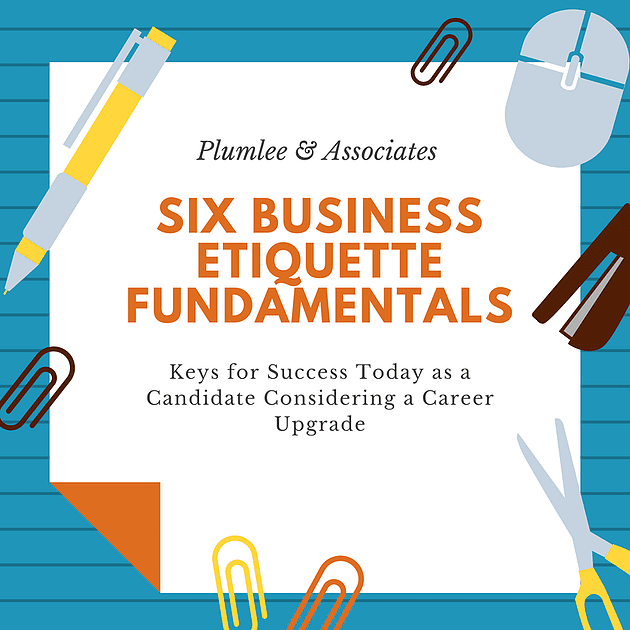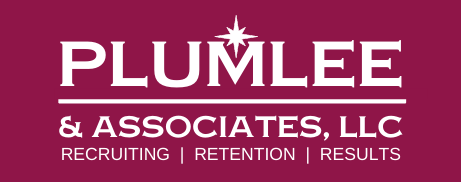In today’s candidate-driven job market, it has never been more important to follow proper business etiquette. You may ask yourself two questions: #1 – “What is business etiquette? #2 – “How do I know if I am following these rules?”
We will give you the definition of business etiquette and share some of the most important business etiquette rules you should always follow.
BUSINESS ETIQUETTE BASICS
The foundation is as follows:
“[It is] (a)bout building strong relationships in your field by fostering better communication. This can only happen when those you work with feel secure and comfortable. Although basic business etiquette may vary from country to country, some principles stand the test of time and geography.” – The Chron
Business etiquette allows respect and fosters a healthy work environment. As the definition stated, some of these rules change depending on your work environment and where you are geographically located in the world. In today’s post, we will share universal guidelines of business etiquette you can apply across in any work environment and in any location.
#1 – DRESS APPROPRIATELY
Each workplace has a different dress code, but it’s important to understand what that the current dress code looks like. Of course, be sure to dress appropriately. This means if the dress code is business casual, you don’t want to show up to work wearing a shirt or pants with holes in them because that’s not respecting the work place. A business etiquette “win” when it comes to dress code is upholding the standard set by your company and its’ senior leaders.
#2 – ARRIVE ON TIME
You know the military saying, “If you’re on time, you’re late.” Use this quote as your guide to show up to meetings, interviews, and appointments with clients. Arriving late is bad business etiquette and gives the impression that you don’t care about the other individuals time. While we know this is not the case, perception is reality in business.
A tip our team likes to use at the Plumlee & Associates office is to strive and be 5 minutes early to everything! This gives our team a grace period should we get tied up with something else, but we are still able to attend a meeting on time!
#3 – FOLLOW-UP
This is a business etiquette rule that goes largely discarded in corporate America. The follow up means to continue the conversation and can also be considered a networking skill. The follow-up takes the form of writing an email to the hiring manager who you just interviewed with, connecting with people you received business cards from at an event on LinkedIn, or taking the time to reach out to the person you met with for coffee.
This simple rule in business etiquette is not only polite, but also continues to foster and grow relationships within your professional network.
#4 – DON’T INTERRUPT
Have you ever had that co-worker who would interrupt or talk over what you were saying? Or you were in a meeting and there was that guy/girl who would interrupt your boss?
Don’t be that person!
Simply wait until that person is finished speaking to share your thoughts or give insightful comments during the meeting! All of us have two ears and one mouth; a wise person once said: “You should listen twice as much as you speak.”
#5 – WATCH YOUR LANGUAGE
In the workplace you always want to keep the language clean and professional. A good rule of thumb:
if you must think about if you should share a comment, phrase, or word AND you think might be taken the wrong way or be offensive – DO NOT say it. Once something is verbalized, it can never be taken back.
#6 – DO NOT GHOST
Ghosting is the practice of ending a personal relationship with someone suddenly and without explanation withdrawing from all communication. In 2018, ghosting has become fairly common with candidates interviewing with companies. Candidates will interview with a company; the company will reach out to the candidate after the interview, and then hear nothing from the candidate.
This is never good business etiquette; regardless of what company you interview with today, you might need to stay in contact in the future. Business people talk – whether in your current industry or in a different vertical. You don’t want your name floating around as someone that they interviewed and then never heard from again.
After an interview, if you don’t think the job is the right fit for you, call or email the hiring manager thanking them for the opportunity but you decided to go another route. See below as an example of an email template you can send an employer:
You want to keep this email short and personalized because the person you are writing to has a busy schedule. Here is the breakdown of what your email should include to show you were listening and invested in the company/person you were speaking to:
Paragraph 1 — Recall and discuss one point from your conversation
Paragraph 2 — Refer to their team’s relationship with your team to-be
Paragraph 3 — Mention a detail that the interviewer disclosed to you
These six business etiquette guidelines rules can be used anywhere and with any company! We would love to hear your thoughts on this topic in the comments below.
– Martin Plumlee is the Owner and Senior Executive Recruiter for Plumlee & Associates (www.plumleeassociates.com), based in Franklin, Tennessee. For over 18 years, he has been a successful Sales Executive, Talent Strategist and Leadership Consultant. Outside of business, he loves his life and duties as a husband, father and Citizen-Soldier; Martin currently serves in the Army Reserves in Des Moines, IA. He has humbly served on both Active Duty and in the Reserves for over 15 years. He is a graduate of the US Military Academy at West Point (1994) and earned an MBA in International Business from Tennessee Technological University (2006). Please connect with him on LinkedIn and follow the firm on Twitter (@PlumleeAssoc) and Facebook (PlumleeAssociatesNashville).
– Julianna Christensen is the Client Services Analyst at Plumlee & Associates. She is a 2013 graduate of the US Military Academy at West Point and commissioned as a Human Resources Officer in the US Army. Originally from Cincinnati Ohio, she recently transitioned to the private sector following five years of active duty service.


